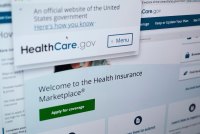Latest KFF Health News Stories
Medicaid Is Paying for More Dental Care. GOP Cuts Threaten To Reverse the Trend.
More than three dozen states cover dental services for low-income and disabled individuals on Medicaid, in recognition of such care’s importance to overall health. But with about $900 billion in funding cuts expected to hit states over the next decade, many programs could roll back dental coverage.
Should Drug Companies Be Advertising to Consumers?
Aging means “becoming a target” of the industry, one expert said. After decades of debate, politicians of all stripes are proposing bans.
Obamacare Sign-Ups Drop, but the Extent Won’t Be Clear for Months
Experts say Affordable Care Act sign-up data won’t be clear until people who were enrolled have paid — or haven’t paid — their new, often much higher, premiums.
This Ballad Hospital, Flooded by Hurricane Helene, Will Be Rebuilt for $44M in a Flood Plain
Ballad Health, the nation’s largest state-sanctioned hospital monopoly, plans to rebuild Unicoi County Hospital on land that two climate modeling companies say is at risk of flooding.
When the Doctor Needs a Checkup
The physician workforce is aging fast, and some hospitals now require that older clinicians undergo testing for cognitive decline. Many have resisted.
When Suicidal Calls Come In, Who Answers? Georgia Crisis Line Response Rates Reveal Gaps
In Georgia, a high number of callers to the 988 crisis line hang up or disconnect before reaching a counselor. Many other calls are transferred out of state.
‘Abortion as Homicide’ Debate in South Carolina Exposes GOP Rift as States Weigh New Restrictions
A proposed abortion ban in South Carolina would have allowed the criminal prosecution of women who obtain the procedure. It’s unlikely to become law, but this bill and other proposals across the country show how some conservative lawmakers are embracing increasingly punitive abortion restrictions.
After Outpatient Cosmetic Surgery, They Wound Up in the Hospital or Alone at a Recovery House
Some patients who had liposuction or other surgeries later required emergency hospital care — and some died, court records show.
Washington’s Homeless Hide in Plain Sight, Growing Sicker and Costing Taxpayers More
The White House says encampment sweeps have enhanced the capital, but city leaders estimate nearly 700 homeless people roam by day and bed down outdoors by night. Some have scattered to the suburbs while others avoid detection, making it hard for medical providers to care for them.
Cómo decidir quiénes califican como “médicamente frágiles” según las reglas laborales de Medicaid
Ante la falta de directrices claras a nivel federal, los estados deben llegar a un acuerdo sobre cómo definir la fragilidad médica.
An Arm and a Leg: A Few Good Things From 2025 (Really)
Good news for health care access this year includes new state laws to rein in prior authorization and medical debt collectors.
From Narcan to Gun Silencers, Opioid Settlement Cash Pays Law Enforcement Tabs
Local governments have received hundreds of millions of dollars from the opioid settlements to support addiction treatment, recovery, and prevention efforts. Their spending decisions in 2024 were sometimes surprising and even controversial. Our new database offers more than 10,500 examples.
A Ticking Clock: How States Are Preparing for a Last-Minute Obamacare Deal
Even if Congress strikes a deal soon to extend more generous Affordable Care Act subsidies, the prices and types of ACA plans available could change dramatically. Unprecedented uncertainty and upheaval could cloud this year’s open enrollment season, which begins in most states on Saturday.
Por qué los huesos frágiles no es solo un problema de las mujeres
Uno de cada cinco hombres mayores de 50 sufrirá una fractura vinculada a la osteoporosis, y entre los adultos mayores, aproximadamente una cuarta parte de las fracturas de cadera ocurren en hombres.
Why Brittle Bones Aren’t Just a Woman’s Problem
More men are now living long enough to develop osteoporosis. But few are aware of the risk, and fewer still are screened and treated.
Why Democrats Are Casting the Government Shutdown as a Health Care Showdown
Democrats are pressuring Republicans to extend billions of dollars in federal tax credits that have dramatically lowered premiums and contributed to record-low rates of uninsured Americans. It’s a chance to talk about a winning issue — and maybe regain support from working-class voters.
Health Centers Face Risks as Government Funding Lapses
Community health centers are key to delivering care in underserved communities around the country, but their services could be disrupted or scaled back after governments did not renew their funding.
‘Demon Copperhead’ Author Lays Foundation for Women in Appalachia To Beat Addiction
Barbara Kingsolver won a Pulitzer Prize for her bestselling novel about Appalachia’s drug crisis. She invested some of the proceeds into a home for women trying to beat substance use disorders.
Batalla para proteger a los pacientes de deudas médicas se traslada a los estados
A pesar de algunos avances este año, los recientes reveses en las legislaturas más conservadoras dejan claro lo difícil que es proteger a los pacientes.
As Trump Punts on Medical Debt, Battle Over Patient Protections Moves to States
Some states are enacting medical debt laws as the Trump administration pulls back federal protections. Elsewhere, industry opposition has derailed legislation.
























